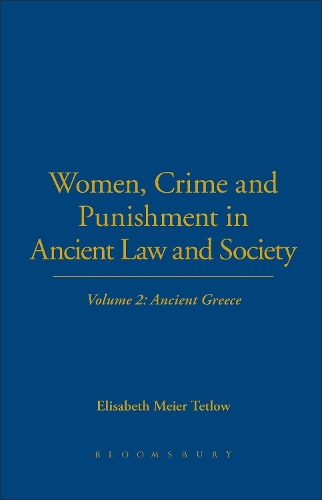
Women, Crime and Punishment in Ancient Law and Society: Volume 2: Ancient Greece
(Hardback)
Available Formats
Publishing Details
Women, Crime and Punishment in Ancient Law and Society: Volume 2: Ancient Greece
By (Author) Elisabeth Meier Tetlow
Bloomsbury Publishing PLC
Continuum International Publishing Group Ltd.
1st May 2005
United Kingdom
Classifications
General
Non Fiction
Crime and criminology
Systems of law
Gender studies, gender groups
364.374093
Physical Properties
Hardback
300
720g
Description
The ancient period of Greek history, to which this volume is devoted, began in late Bronze Age in the second millennium and lasted almost to the end of the first century BCE, when the last remnant of the Hellenistic empire created by Alexander the Great was conquered by the Romans. Extant texts of law of actual laws are few and often found embedded in other sources, such as the works of orators and historians. Greek literature, from the epics of Homer to the classical dramas, provides a valuable source of information. However, since literary sources are fictional portrayals and often reflect the times and biases of the authors, other more concrete evidence from archaeology has been used throughout the volume to confirm and contextualize the literary evidence about women, crime, and punishment in ancient Greece. The volume is divided into three parts: (I) Mykenean and Archaic Greece, (II) Classical Greece, and (III the Hellenistic Period. The book includes illustrations, maps, lists of Hellenistic dynasties, and Indices of Persons, Place and Subjects. Crime and punishment, criminal law and its administration, are areas of ancient history that have been explored less than many other aspects of ancient civilizations. Throughout history women have been affected by crime both as victims and as offenders. In the ancient world, customary laws were created by men, formal laws were written by men, and both were interpreted and enforced by men. This two-volume work explores the role of gender in the formation and administration of ancient law and examines the many gender categories and relationships established in ancient law, including legal personhood, access to courts, citizenship, political office, religious office, professions, marriage, inheritance, and property ownership. Thus it focuses on women and crime within the context of women in the society.
Reviews
"Tetlow approached her subject as a feminist historiographer interested in describing the rights of women in the administration of justice. Tetlow's historiography is informed by the thesis that urbanism was more conducive to the public agency of women than tribalism. Tetlow has provided a readable and full description of available materials, especially those translated into English. Her effort to record the name of every woman whom the sources contain is a valuable contribution" -Catholic Biblical Association of America, July 2006
Author Bio
Elisabeth Meier Tetlow has a Doctor of Law degree as well as five Master of Arts degrees in philosophy, theology, biblical studies, and Semitic languages. She has been a visiting scholar in law and religious studies at Loyola University of New Orleans since 1992.
